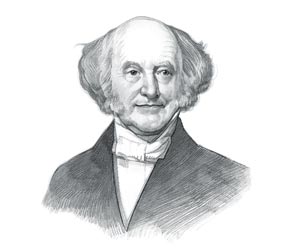|
Martin Van Buren carried
on with the policies begun by his predecessor, President
Andrew Jackson.
The major accomplishments and the
famous, main events that occurred during the time that
Martin Van Buren was president included the Panic of
1837, the Neutrality Law of 1838, the tragic events of
the Trail of Tears (1838) and the Amistad incident
(1839). Communications leapt forward in this period with
the invention of the telegraph by Samuel Morse. Martin Van Buren
died of asthmatic suffocation on July 24, 1862, aged 79. The next president was
William
Harrison.
Birthday:
December 5, 1782
Place of Birth:
New York
Political Party:
Democratic
Nickname: Red
Fox of Kinderhook
Number: 8th
President
Vice President:
Richard M. Johnson
Age at Inauguration:
54
Height: 5 feet
6 inches
Weight: 164
pounds
First Lady:
Angelica Van Buren
Religion:
Dutch Reformed
Date of Death:
July 24, 1862
Date of Martin
Van Buren
Presidency: March 4,
1837 to March 4, 1841
The
Nickname of Martin Van Buren: Red Fox of Kinderhook
The nickname of President Martin Van Buren provides an insight into
how the man was viewed by the American public during his presidency.
The meaning of the Martin Van Buren nickname "Red Fox of Kinderhook" refers to his
Dutch heritage his reputation as a wily, cunning politician.
Kinderhook referred to his hometown in New York and "Red Fox" is in
reference to his his red-colored whiskers.
Character and Personality Type of Martin Van Buren
The character traits of President Martin Van Buren can be described
as outgoing, charming, bright, optimistic, courteous and as cunning
as a fox. It has been speculated that the Myers-Briggs
personality type for Martin Van Buren is an INFJ (introversion, intuition,
feeling, judging). A congenial but quiet leader with a intuitive,
complex and confident character and a strong goal to better the
lives of others. Martin Van Buren Personality type: conscientious, perceptive,
creative and a perfectionist.
Accomplishments of Martin Van Buren and the Famous Events during his Presidency
The accomplishments of Martin Van Buren and the most famous events during his
presidency are provided in
an interesting, short summary format
detailed below.
Panic of 1837
Summary of the Panic of 1837: The
Panic of 1837
occured during the presidency of Martin Van Buren but were largely
due to changes in the banking system initiated by
President Jackson and his Specie Circular that
effectively dried up credit. President Martin
Van Buren was blamed for the Panic of 1837 and his proposals
for amending
the banking system met with strong opposition by the
Whigs, led by Henry Clay, who had
previously introduced the economic plan called the 'American
System'.
Aroostook War
Summary of the Aroostook War: The
Aroostook War
was a bloodless border conflict between Maine and the
province of New Brunswick, from February to May, 1839, who both
claimed rich timber land in the highlands area known as Aroostook.
The Maine-New Brunswick boundary was later settled by the
Webster-Ashburton Treaty of 1842
during the presidency of John Tyler.
The Trail of Tears
Summary of the Trail of Tears: The infamous event known as the
Trail of
Tears
began during the presidency of Martin Van Buren. Trail of Tears
involved the 1000 mile march during the forced relocation of the
Five Civilized Tribes consisting of the Cherokee, Creek, Choctaw,
Seminole and Chickasaw people. The tribes were forced to travel,
from their homelands in the Southeastern United States to
reservations in present day Oklahoma, as a result of the Indian
Removal Act of 1830 that had been enacted during the
presidency of Andrew Jackson.
The Amistad Slave Ship
Summary of the Amistad Slave Ship: The
Amistad
Slave Ship involved a rebellion of 53 Africans who had
been abducted from Sierra Leone by Spanish slavers to be shipped as
slaves to Cuba. The slaves seized control of the ship and
ordered the navigator to sail for Africa but the
Amistad was intercepted two months later off New York
on 26 August 1839. The Amistad Case was later fought by John
Quincy Adams and the 35 survivors of the rebellion were allowed to
return to Sierra Leone in 1842.
Samuel Morse and the First Telegraph
Summary of Samuel Morse and the First Telegraph:
During the presidency of
Martin Van Buren a new invention revolutionized communication in the
US.
Samuel Morse
and the First Telegraph
were developed and patented in the United States in
1837. Morse demonstrated his invention by
sending telegraph messages between the Senate and House. |

